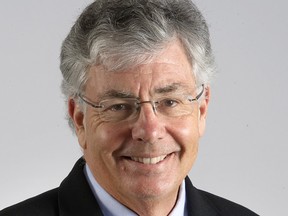
My last Wealthy Boomer blog
After 19 years at the Financial Post, this is my last column and/or blog, at least as a full-time staff writer. Even though I’ll soon turn 59 and have written much about retirement and financial independence, I am not yet retiring.
Instead, I’m making a career shift that involves more editing and less writing, one I expect and hope will carry me over a good chunk of my sixties. It still involves personal finance, a field that has greatly expanded since I took over the FP’s Personal Finance column from the meticulous Bruce Cohen in 1996.
Long before I joined the then-standalone Financial Post in 1993, I was a faithful subscriber and reader. I had been out of journalism for several years, and when I decided to return to the business at age 40, I reasoned I should write for the publication I read faithfully every day. Bruce’s column was a must-read, as were those of colleagues Diane Francis,
My last Wealthy Boomer blog
Barry Critchley and Sonita Horvich. (Terry Corcoran hadn’t yet joined us at that point.). They ran Bruce’s column three times a week. This was before the web had transformed the media landscape.In my last Wealthy Boomer blog, I recall Bruce staunchly declaring it was “impossible” to do more than three PF columns a week.
That was true for him because of the way he approached the task: he went into considerable depth and took pains to ensure every fact was accurate [the key to this beat.] I got to know him sitting directly across from his desk when I was the mutual funds reporter.
Newspapers like to “twin” writers as a sort of insurance policy for editorial continuity. Sure enough, Bruce did “retire,” but not before generously sharing his contacts with me and insisting I take over his column. In recent years, Family Man columnist Garry Marr has sat across from me: we’ve developed a good working relationship that includes the “Boomer/Junior” column in FP Magazine. I’m happy to pass the torch to Garry.
The column above is virtually
Today, it has at least three I can think of, defining it broadly. At the Post, counting outside writers, there must be half a dozen, either in the paper or feeding the ever-voracious web under the watchful eyes of Personal Finance editor Suzanne Steel.
Worldwide, there are thousands of personal finance blogs, discussion forums, newsletters and social media financial pundits, many of which are on my Twitter lists. The web sites of most major newspapers include sections devoted to personal finance; it’s a staple on financial television shows, and there’s a veritable torrent of books on the subject.
The challenge is absorbing it all in a meaningful way, which requires distinguishing between mere data, useful information and actionable knowledge—sorting the wheat from the chaff. This is as much an editing as a writing function, which is one of my rationales for making this career change.
Whatever happened to retirement?
So whatever happened to retirement? It’s ironic that this avalanche of information is ostensibly in aid of helping readers “retire,” as if the working world were some sort of disease that had to be cured.My last Wealthy Boomer blog: Retirement has long been the raison d’être of most of the world’s banks, brokerage firms, mutual fund companies and insurance firms.
But increasingly, retirement is like the proverbial mirage in a desert, forever fading into the distance the closer you approach it. For Baby Boomers in particular—to whom the Wealthy Boomer blog catered—retirement looks more and more like a chimera. The government’s hopes to push back the retirement age from 65 to 67 are more evidence of that.
My last Wealthy Boomer blog That’s one reason I wrote a financial novel that distinguishes between retirement and financial independence.
While this may be the outcome for many fellow Baby Boomers, I caution that the option of working well into one’s sixties or seventies should not become an excuse not to save for retirement. First, there’s no guarantee employers will always wish to avail themselves of your services. Second, at some point, either the body or the mind will no longer permit full-time employment.
To all my readers, sources, colleagues and competitors, thank you.
Postscript: “You have delighted us long enough.”
I can’t resist adding a postscript for readers of the blog only.
My last Wealthy Boomer blog The column above is virtually what is appearing in the newspaper on March 24, but for this blog, which has always had a slightly different slant, I wish to add a few more thoughts. This despite Suzanne’s witty suggestion that “you have delighted us long enough.” (Fans of Pride & Prejudice will surely pick up on that literary reference.)
For those who are interested in the financial aspects of the baby boom generation, my Twitter account contains a list of roughly 500 tweeters in North America who focus on baby boomers. It’s called The Wealthy Boomer list. You can find another 500 financial sources of information on my Findependence Day list and I maintain several other lists focused on various aspects of personal finance and economics.
In the meantime, I may blog once or twice a week on my personal web site, www.findependenceday.com.In my last Wealthy Boomer blog, I’ll continue to be active on Twitter and three other social media platforms: Facebook, LinkedIn, and Google Plus.
Some may find the recently published National Post e-book of some of my 2011 columns of interest, entitled The Best of Jonathan Chevreau.
And now I fear I have indeed delighted us long enough. Thank you, goodbye for now and see you on the other side.


